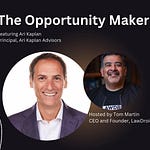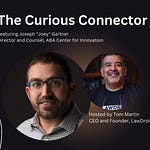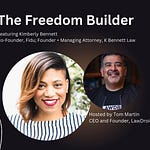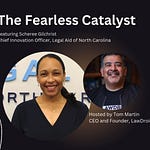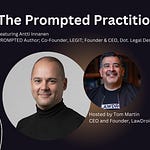Hey there Legal Rebels! 👋 I'm excited to share with you the 20th episode of the 2025 season of the LawDroid Manifesto podcast, where I will be continuing to interview key legal innovators to learn how they do what they do. I think you're going to enjoy this one!
If you want to understand how to practically implement AI and design thinking in your legal practice while maintaining creative freedom and building something meaningful, you need to listen to this episode. Jennifer is at the forefront of legal innovation and brings a uniquely thoughtful approach to helping lawyers navigate the intersection of technology and human-centered design.
Transforming Legal Practice Through Creative Innovation and AI
Join me as I interview Jennifer Leonard, founder of Creative Lawyers and adjunct professor at University of Pennsylvania Law School.
In this insightful podcast episode, Jennifer shares her journey from small-town Pennsylvania through big law to becoming a leading voice in legal innovation. She shares how she's helping law firms, courts, and legal organizations reimagine their approach to client service through AI and design thinking. Jennifer also reveals how her experience as both a practitioner and educator has shaped her understanding of what the legal profession needs to thrive in an AI-powered future.
Her stories and insights underscore the critical importance of shifting mindset from viewing AI as a threat to seeing it as a powerful co-intelligence that can help lawyers focus on higher-value strategic work. This episode is a must-watch for anyone interested in the practical intersection of legal practice, technology, and human-centered design, offering valuable perspectives on building a more client-centric profession.
The Skinny
Jennifer Leonard, founder of Creative Lawyers and adjunct professor at University of Pennsylvania Law School, shares her evolution from a suburban Philadelphia kid who initially wanted to be a veterinarian to becoming a leading voice in legal innovation. After experiencing the limitations of traditional law firm practice and discovering her passion for education and design thinking, Jennifer founded Creative Lawyers in 2022, just as ChatGPT was revolutionizing the legal profession.
Through her work with law firms, courts, and corporate legal departments, Jennifer helps lawyers shift their mindset from viewing AI as a threat to embracing it as co-intelligence that can enhance their strategic capabilities. Her approach combines practical implementation with human-centered design principles, helping lawyers reimagine how they deliver services while maintaining the creative freedom and building opportunities that make the work meaningful.
Key Takeaways:
Jennifer's journey from wanting to be a veterinarian to becoming a legal innovator demonstrates the value of following curiosity and embracing unexpected paths
Her experience in big law litigation revealed fundamental challenges with the billable hour model and inspired her focus on reimagining legal service delivery
Writing skills developed during her judicial clerkship, learning to accept criticism and improve incrementally, became foundational to her innovation mindset
The timing of founding Creative Lawyers in 2022 coincided perfectly with ChatGPT's release, shifting her focus from general innovation to AI implementation
Her background as both practitioner and educator provides unique insight into what lawyers need to succeed in an AI-powered future
Jennifer emphasizes treating AI as co-intelligence rather than replacement technology, helping lawyers focus on higher-value strategic work
Her structured workshop approach helps firms explore AI capabilities safely while thinking beyond point solutions to comprehensive business transformation
Lawyers often make the mistake of trying to get AI to do exactly what they currently do, when they should explore how it can help them solve bigger problems
The profession's critical thinking strength can become a weakness when lawyers focus too much on current AI limitations rather than future possibilities
Creative freedom and the ability to build something meaningful are non-negotiable elements for professional satisfaction
Notable Quotes:
"I come to it naturally, I think, in the same way. But I have the luxury of having a little bit more time, I think, than somebody practicing law every day to dig in, learn as much as I can about AI, and then use some of the tools I've developed as a professor to try to translate what all of this means in a language that is digestible for lawyers." - Jennifer Leonard (01:53-02:09)
"I think mindset is like 90% of everything that we do." - Jennifer Leonard (06:52)
"I was not born to be a law firm lawyer. That was basically clear to me by lunch the first day." - Jennifer Leonard (21:58-22:02)
"I think for a course like generative AI and law practice, with a topic like that, it just gives me such an opportunity to learn myself because you really have to be ahead of where your students are and understanding and shaping a curriculum." - Jennifer Leonard (05:40-05:52)
"I don't remember the exact first prompt that I put into ChatGPT. I just remember being stunned like everybody else was that I could log on as somebody not particularly tech fluent and ask it to create a recipe for beef stroganoff and the voice of Shakespeare." - Jennifer Leonard (32:48-33:05)
"I just felt like very early on that it was going to change things. And it was only going to get better from there. And every time it gets better, it's only going to get better from there." - Jennifer Leonard (34:27-34:31)
"I view the role of a guide to be creating general purpose activities where teams and firms and courts and schools can come together in carved out space." - Jennifer Leonard (41:04-41:12)
"Lawyers tend to gravitate and want to have the AI do the exact thing that they do that currently adds value for their client. And they're like disappointed when they say draft a lease provision or draft a tax comment letter." - Jennifer Leonard (44:54-45:09)
"I encourage them to spend less time focused on the limitations of today's technology and more time focused thinking about thought experiments. Like if you could shrink the preparation time for a deposition from eight days to eight hours, what does that mean for your business?" - Jennifer Leonard (47:02-47:19)
"Being able to be creative and being able to build is something that I have to have in my professional life. And it's sort of like a non-negotiable for me since COVID." - Jennifer Leonard (52:17-52:26)
Clips
Accelerated Progress With ChatGPT
AI Uncovers Hidden Insights In Client Engagements
Legal Education and Human-Centered Design
Not Born to Be A Law-Firm Lawyer
Jennifer's story illustrates the power of embracing curiosity over rigid career planning. Her journey from animal bioscience to political science to law to legal innovation shows how diverse experiences create unique value. Her early struggles with legal writing during her clerkship, learning to accept extensive red-line edits and improve incrementally, became foundational training for the innovation mindset she brings to helping lawyers adapt to AI.
What makes Jennifer's approach particularly valuable is her combination of practical legal experience with deep expertise in education and design thinking. She understands both the challenges lawyers face in adopting new technology and the pedagogical methods needed to help them learn effectively. Her structured workshop approach allows lawyers to explore AI capabilities safely while shifting their mindset from fear to opportunity.
Closing Thoughts
Jennifer Leonard represents exactly the kind of thoughtful, practical guide our profession needs as we navigate the AI revolution. Her combination of legal expertise, educational insight, and design thinking provides a roadmap for lawyers who want to embrace technology without losing their humanity or professional values.
What strikes me most about Jennifer's approach is her emphasis on mindset over tools. While many focus on which AI platform to use or which features to implement, Jennifer helps lawyers understand how to think differently about their work, their clients, and their value proposition. Her insight that lawyers often want AI to do exactly what they currently do, rather than helping them solve bigger problems, captures a fundamental challenge in our profession's relationship with innovation.
For our Legal Rebels community, Jennifer's journey offers both inspiration and practical guidance. You don't need to be a technology expert to lead innovation in your firm or organization. What you need is curiosity, willingness to experiment, and the kind of creative mindset that sees technology as an opportunity to build something better rather than a threat to defend against.
As the legal profession continues to evolve rapidly, those who approach change with Jennifer's combination of practical wisdom and creative enthusiasm will be best positioned to thrive. The future belongs to lawyers who can balance critical thinking with creative exploration, using AI as co-intelligence to deliver better outcomes for clients while maintaining the creative freedom that makes legal work meaningful.





